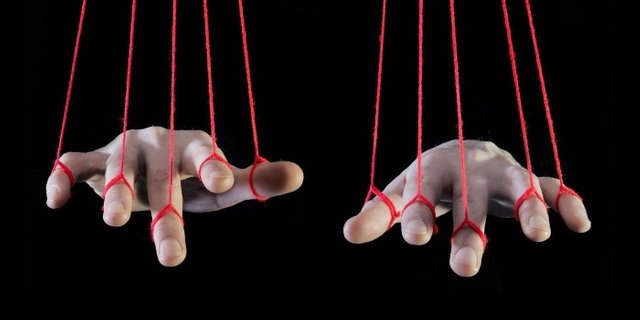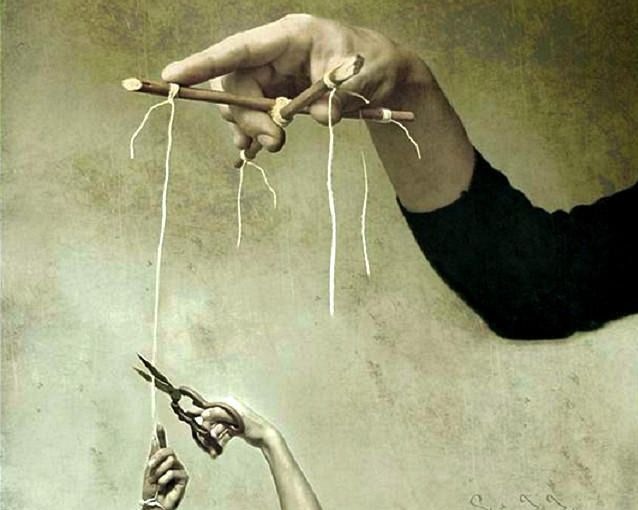Free Will: Intention interrupts our deterministic reactive nature (PII)
This article is part II of a two part article on free will and how it relates to determinism and intentionality. It begins immediately where part I left off. For Part I please click the direct link below.
.jpg)
Conscious vs Unconscious Behavior
To demonstrate the idea of conscious and unconscious behavior, we could think of an emotion such as anger or an involuntary act such as fidgeting. In the case of anger, the emotion is created from some external influence which creates an internal chain reaction of responses within the body and the brain. Each cause leads to an effect which ultimately leads to the end result of the emotion anger.
In this way, we can see that anger is a reactionary response and that it is determined by causality. A causal event leads to a reactionary response.
Something to note in this process is that at no point during the chain of events does the person intend to feel angry. Because of this, we could say that
Anger is an unconscious reaction that simply happens.
The act of fidgeting behaves in the same way. Often the body undergoes involuntary movement such as tapping of the fingers or bouncing of the knee. In such cases, the individual does not intend to fidget, fidgeting simply happens, it is a reaction. This behavior is a reaction, which makes it an unconscious behavior.
We can see that these behaviors are unconscious because when the self becomes aware of the fidgeting, or aware of an emotion such as anger, the emotion or behavior often stops because the individuals awareness interrupts the reactionary response. These examples suggest that the behaviours take place without conscious intention and also that self-awareness and intention operate on a conscious level and influence a person’s actions, and emotions. From this, we can conclude that reaction, which is deterministic in nature, operates on an unconscious level whereas intention and self-awareness operate on a conscious level.
.jpg)
Some philosophers also state that an act of the will is not initial act, but that they too are an effect of a person’s thoughts and drives. Furthermore, a person’s drives determine the choice of their decision and it is the predominant drive which decides the final decision. In this way, acts of will are always a necessary result, determined by an infinite regress of causes and never an absolute beginning in and of themselves.
These arguments rely on the notion that individuals operate continuously below conscious thought, constantly reacting to their impulses, desires and environmental situations. However, I believe that it is possible for an individual to interrupt their reactionary responses by means of conscious self-awareness and in doing so, an individual is able to inhibit the next response in the chain reaction of an unconscious behaviour. In this way, the individual is able to move away from a state of reacting and toward a state of intending.
In other words, when an individual becomes aware of the self and aware of the motives of their behaviour, the chain reaction becomes interrupted which in turn creates a moment of freedom. Within this new moment, a new course of action can be intended which makes reality open for a new possibility and an act of free will.
.jpg)
To demonstrate this, we can recall the example of anger. Normally, if an individual experiences a situation that would typically cause anger within them and if that person is operating on a level below conscious awareness, then the situation will determine the outcome of their behaviour. For instance, lets imagine that a negative situation occurs which sparks the release of adrenaline and other bodily mechanisms such as the heart pounding. In this situation the body mechanisms also affect the mind which produces negative psychological thoughts and ultimately, the person experiences anger. However, if in the early moments after the initial situation, the person becomes aware of their bodily state and moves into a state of higher consciousness (above the reactionary response mechanisms of causality) then they will interrupt the chain of events and anger will not take place (at least briefly).
In this new situation the person has interrupted their typical reaction and has created a moment of freedom, within which, the person will have the opportunity to intend a new course of action and behavior. They will have the ability to choose whether to indulge in the emotion and experience it fully or to move towards an alternate intention such as forgiveness or understanding. In the new moment, the person demonstrates conscious thought which is not subject to reaction responses and therefore not reliant upon causality or determination. The intention itself is a conscious desire for a specific outcome. It is an act of the imagination and a new beginning created in a present moment in time. From there, all further actions or behaviors are effects of the initial intention and may once again be subject to determinism, but the initial intention is a moment of free will.
Conclusion
Though individuals often function deterministically by means of reacting to their environments, their internal states, and their desires, the unconscious nature of the individual’s state of thought reveals that as long as they are reacting, they are not intending. However, through self-awareness and conscious thought, the individual is able to interrupt the reactionary response and create a new beginning in which they are able to intend a new course of action. Therefore, free will is the breaking of the cycle of reaction and consciously intending ones course of movement and behaviour within the present moment.
That concludes part II of this article on free will. Please feel free to comment or share your thoughts and opinions.
Thanks for tuning in

Yes. It's true our tendency to act in ways predetermined by inherent thought patterns can only be broken by mindfulness. Self awareness helps us confront our thoughts that influence our actions in the background and presents the opportunity to make a choice, to react or not to react.
Yes I agree. Mindfulness is the key :)
Have you defined what you mean by free will at all? I only read this article, not your previous ones, but the 'sense of control over what you're doing' as opposed to the unconscious, routine behaviors and emotions is a very specific idea of free will.
Your article seems to be arguing that 'freedom' is to 'feel like you're in control of what you're doing.'
Do you believe that, regardless of the feeling of control, awareness, redirection, whatever - that this could be predicted if you knew all the positions of atoms in the universe? Do you believe there is something fundamentally 'other', nonmaterialistic, soul-like, or uncaused, about free will?
My first article defines free will. Whether it is a good definition or not is another story though lol. Its open for discussion and argument - for sure.
hmm. Prediction is a challenging concept. Prediction is a whole other thing that is beyond my knowledge. I'm not a philosopher but I believe that something can be determined but not predicted.
I personally do NOT believe that one could predict thoughts or behavior based on the position of the atoms in the universe. I guess I do believe that there is something more "non-materialistic" about us. Something like a consciousness that flows through the universe and relates to the particles. Like quantum waves collapsing into particle reality. That probably sounds weird and the thought is not fully developed so it probably doesn't make a lot of sense either. I'll have to think about it a bit more.
What are your thoughts on the subject. I'm interested to hear your opinion
Upvoted and resteemed. Do you want to know why? Visit @pf-coin. ;-)
thank you!!
I hate being angry and not able to control it :/
yeah me to :)